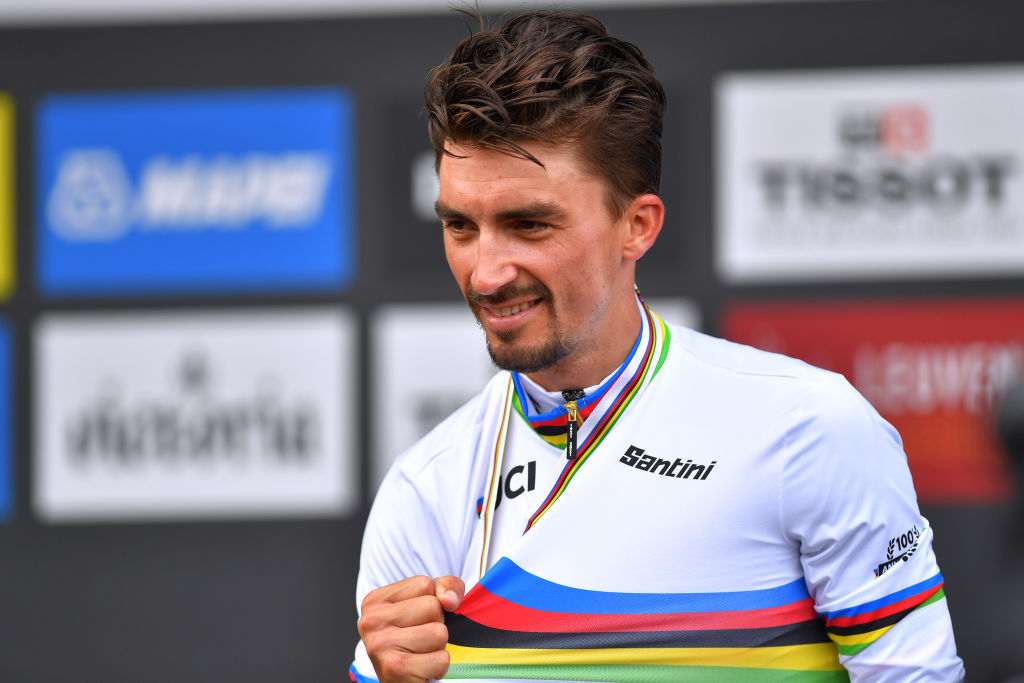Julian Alaphilippe: Losing the rainbow jersey would have also been a form of relief
Two-time world champion on the contradiction behind his Leuven triumph

Julian Alaphilippe has spoken of the contradiction at the heart of this second successive world title, admitting that losing the rainbow jersey would have been “a certain form of relief” and yet explaining how he went to close to breaking point to claim victory in Leuven on Sunday.
The Frenchman won four races in his first stint in the rainbow jersey, including Flèche Wallonne and the opening stage of the Tour de France, but he was not the outstanding favourite to retain his title in Flanders.
Yet Alaphilippe proceeded to deliver an exhibition in the World Championships road race, attacking repeatedly in the final 50km and finally forging clear alone with a little over a lap remaining.
"Without being defeatist, I was prepared to lose the jersey,” Alaphilippe told L’Équipe.
“I also know what it cost me. It took up a lot of energy. It made me make some mistakes sometimes, through my impatience to win, by wanting to show the jersey all the time, to honour it, to make it shine as best I could. It took a lot out of me, and it was also a lot of pressure that I put on myself.
“So I said to myself, ‘We’re coming here to win, but if I lose the jersey, it will also be a certain form of relief.’ But at the same time, I was starting a race and I wanted to win it. So you go for the jersey: it's for history, the most beautiful jersey in cycling. And so you go for it. It’s hard to describe.”
Alaphilippe acknowledged to L’Équipe that racing without the rainbow bands on Sunday had already been a form of liberation. Back in the navy blue of the French national team, he no longer felt the weight of the title upon his shoulders and the eyes of the peloton upon his rear wheel.
Get The Leadout Newsletter
The latest race content, interviews, features, reviews and expert buying guides, direct to your inbox!
“That’s 300% certain. I was liberated. It's hard to explain, but I was much more relaxed,” Alaphilippe said.
“It's really contradictory. I absolutely wanted to win, because we all want to win, but on the other hand, I was happy to be a normal rider again, with less pressure, a rider who can enjoy himself more.
“I haven't lost that idea, but you become obsessed by the desire to do well and that takes some energy. [The rainbow jersey] is one that catches the eye. You can't be bad wearing it; you always want to do better. I don't know, but with the French team jersey, I was freer.”
Alaphilippe pledged to remain the same, aggressive bike rider during his second year in the rainbow jersey but he expressed hope that he would be less demanding of himself in his role as world champion.
“I'm not going to change my way of riding or my way of being, but in my approach to certain objectives, I’m going to try to be more relaxed, that's how it works best,” he said.
“Honouring the jersey every time is really hard. I'm happy with what I've done, but you can't ask too much of me. Sometimes I had the impression that I hadn't done enough, even though I was told that I had honoured the jersey in a way that hadn't been seen for a long time, but I was asking more of myself all the time, all the time. Except that, after a while, I'm human too. Maybe it's little things like that that will change next year.”
Asked to revisit his winning effort on Sunday, Alaphilippe reiterated that he had raced largely on instinct, unlike a year ago when his victory in Imola was predicated entirely on making an explosive effort on the final haul up Cima Gallisterna.
“These are races where you have to like to hurt yourself, you have to be a bit masochistic,” Alaphilippe said of his solo attack in Leuven. “I was at breaking point, it's horrible, but that's how you build great victories. I had already attacked several times, but the last time, I said to myself that I would put everything into it...”
Cyclingnews is the world's leader in English-language coverage of professional cycling. Started in 1995 by University of Newcastle professor Bill Mitchell, the site was one of the first to provide breaking news and results over the internet in English. The site was purchased by Knapp Communications in 1999, and owner Gerard Knapp built it into the definitive voice of pro cycling. Since then, major publishing house Future PLC has owned the site and expanded it to include top features, news, results, photos and tech reporting. The site continues to be the most comprehensive and authoritative English voice in professional cycling.